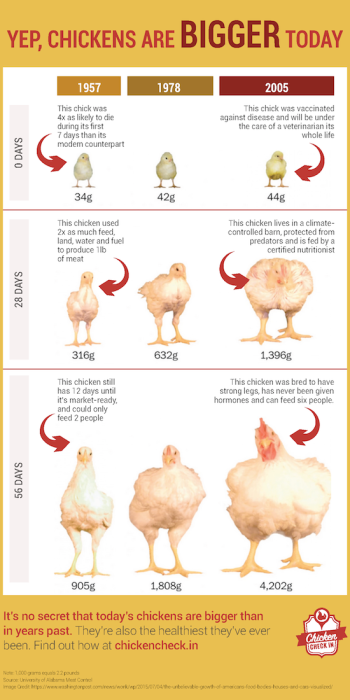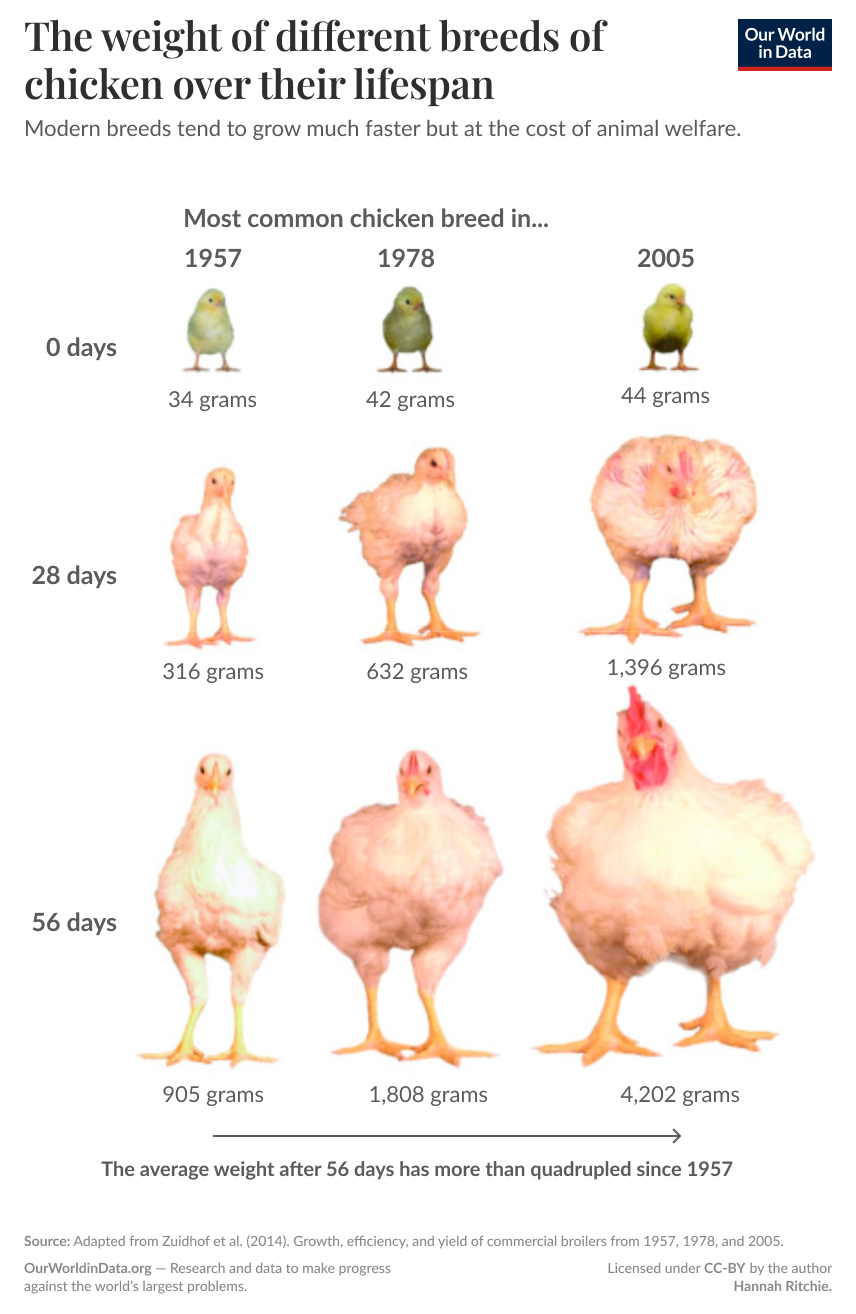Chickens grow rapidly and reach maturity in about 16 to 24 weeks. Growth rates vary by breed and care.
Raising chickens has become popular for both meat and eggs. Understanding their growth timeline is crucial for proper care. Most breeds mature between 16 and 24 weeks, although some may grow faster. Proper nutrition and environment significantly impact their growth rate.
Young chicks need high-protein starter feed to support rapid development. As they grow, transitioning to a balanced diet ensures healthy maturation. Consistent care and monitoring help spot any growth issues early. Knowing the growth stages helps in planning for housing and space needs. Proper growth ensures healthy, productive chickens for years.

Credit: www.purinamills.com
Introduction To Chicken Growth
Chickens are fascinating creatures with a rapid growth cycle. Understanding how fast chickens grow is essential for farmers and chicken enthusiasts. This knowledge helps in managing their care and ensuring healthy development.
Life Cycle Of A Chicken
Chickens have a unique life cycle. It begins with the egg stage. Here’s a breakdown of the stages:
- Egg Stage: The journey starts with an egg, incubated for 21 days.
- Hatchling Stage: Chicks emerge from their shells, starting their growth journey.
- Brooding Stage: This stage lasts up to 6 weeks. Chicks grow feathers and gain weight.
- Juvenile Stage: From 6 weeks to 6 months, chickens experience rapid growth.
- Adult Stage: After 6 months, chickens reach maturity and can lay eggs.
Factors Influencing Growth
Several factors influence how fast chickens grow. These factors are crucial for optimal development.
| Factor | Description |
|---|---|
| Nutrition | A balanced diet with protein, vitamins, and minerals is key. |
| Environment | Clean, warm, and safe living spaces promote healthy growth. |
| Genetics | Certain breeds grow faster due to genetic traits. |
| Health Care | Regular health checks and vaccinations prevent diseases. |
By understanding these factors, you can ensure your chickens grow healthily and efficiently.

Credit: www.chickencheck.in
Hatchling To One Week
From the moment a chick hatches, its journey of growth begins. The first week is crucial for development. This period sets the foundation for a healthy life. Let’s explore this exciting phase, focusing on initial development and nutritional needs.
Initial Development
Chicks hatch from their eggs with a wet, sticky appearance. Within a few hours, they become fluffy and dry. This stage is known as fluffing. It helps them regulate their body temperature.
During the first week, chicks are very active. They start exploring their surroundings. They also begin to peck at food and water. This behavior is essential for their growth.
Chicks’ bones and muscles grow rapidly in the first week. They also start developing their immune system. Their feathers begin to grow, replacing the soft down.
Nutritional Needs
Proper nutrition is vital for chicks’ growth in the first week. A balanced diet ensures they develop strong bones and muscles.
Chicks need a high-protein starter feed. This feed usually contains around 20-24% protein. It provides the essential nutrients for rapid growth.
Ensure fresh, clean water is always available. Hydration is crucial for their health.
| Nutrient | Importance |
|---|---|
| Protein | Builds muscles and feathers |
| Vitamins | Supports immune system |
| Minerals | Strengthens bones |
Adding a vitamin supplement to their water can be beneficial. It helps boost their immune system. Chicks should also have access to grit. Grit aids in digestion by grinding food in their gizzards.
- Provide a warm brooder with a heat source.
- Ensure the brooder is clean and dry.
- Monitor the chicks for signs of illness.
One Week To One Month
Chickens grow rapidly from one week to one month. This period is crucial for their development. In this phase, you’ll notice significant changes in their appearance and behavior. Let’s explore how chickens evolve during these early weeks.
Feather Development
Chicks start with soft, fluffy down feathers. By the end of the first week, small feather stubs emerge. These stubs grow quickly into juvenile feathers. At two weeks, wing feathers become more prominent. By the third week, tail feathers begin to appear. By the end of the month, most chicks have a mix of down and feathers.
Growth Milestones
Chicks achieve many growth milestones from one week to one month:
| Age | Milestone |
|---|---|
| 1 Week | First feathers appear, increased activity levels |
| 2 Weeks | Wing feathers grow, chicks start to perch |
| 3 Weeks | Tail feathers develop, chicks explore more |
| 4 Weeks | Most feathers formed, chicks are more independent |
During this time, feed and care are crucial. A balanced diet supports proper growth. Ensure they have enough space to move around. Clean their living area regularly to prevent diseases.
Tracking these milestones helps ensure your chickens grow healthy and strong.
One Month To Three Months
The period from one month to three months is crucial in a chicken’s life. During this time, they experience significant growth and development. Understanding these changes can help you provide the best care for your chickens.
Changes In Behavior
Chickens start to show more independence around one month old. They begin to explore their surroundings more actively. During this phase, they also start establishing a pecking order. This behavior is natural and helps them form a social structure. You may notice more play-fighting and chasing among them.
Dietary Adjustments
At this stage, chickens need a balanced diet to support their rapid growth. Their diet should include:
- Starter feed with higher protein content
- Access to clean water at all times
- Occasional grit to aid digestion
As they grow, you can start introducing them to grower feed. This feed contains slightly less protein but more nutrients for development.
| Age | Feed Type | Protein Content |
|---|---|---|
| 1-4 Weeks | Starter Feed | 20-24% |
| 5-12 Weeks | Grower Feed | 16-18% |
These dietary adjustments ensure your chickens grow strong and healthy.
Three Months To Maturity
Raising chickens is a fascinating journey. In just three months, these birds grow rapidly and reach maturity. Understanding their growth stages helps in proper care and management.
Physical Changes
Chickens undergo significant physical changes during the first three months. They start as tiny chicks and grow into full-sized birds.
In the first week, chicks have soft, fluffy down feathers. By the end of the first month, they begin to grow their first adult feathers. During the second month, their feathers continue to develop, providing better protection and warmth.
| Age (Weeks) | Physical Changes |
|---|---|
| 1-2 | Soft down feathers |
| 3-4 | First adult feathers |
| 5-8 | Full feather growth |
| 9-12 | Mature appearance |
Reaching Full Size
By three months, chickens are nearly their full size. They grow quickly during this period. Proper nutrition and care are essential for healthy growth.
Chickens need a balanced diet rich in proteins, vitamins, and minerals. Providing clean water and a safe environment is crucial. Regular health checks ensure they remain disease-free.
- Provide a balanced diet
- Ensure clean water
- Maintain a safe environment
- Conduct regular health checks
Reaching full size means they are ready to start laying eggs or being used for meat production. Their rapid growth is a testament to their resilience and adaptability.

Credit: ourworldindata.org
Frequently Asked Questions
How Long Does It Take For Chickens To Grow?
Chickens typically reach full maturity in about 16 to 20 weeks. The growth rate can vary based on breed and care.
What Affects Chicken Growth Rate?
Several factors affect chicken growth, including breed, diet, environment, and overall health. Proper nutrition and care are essential.
When Do Chickens Start Laying Eggs?
Most chickens start laying eggs at around 18 to 24 weeks old. This can vary slightly by breed and conditions.
How Can I Speed Up My Chicken’s Growth?
To speed up growth, provide a balanced diet, clean water, and proper living conditions. Avoid overcrowding and stress.
Conclusion
Chickens grow quickly, with most reaching maturity in just a few months. Proper care and nutrition are essential. By understanding their growth stages, you can ensure a healthy flock. Fast growth means fresh eggs and meat sooner, benefiting both backyard farmers and commercial producers.
Enjoy raising your thriving chickens!
